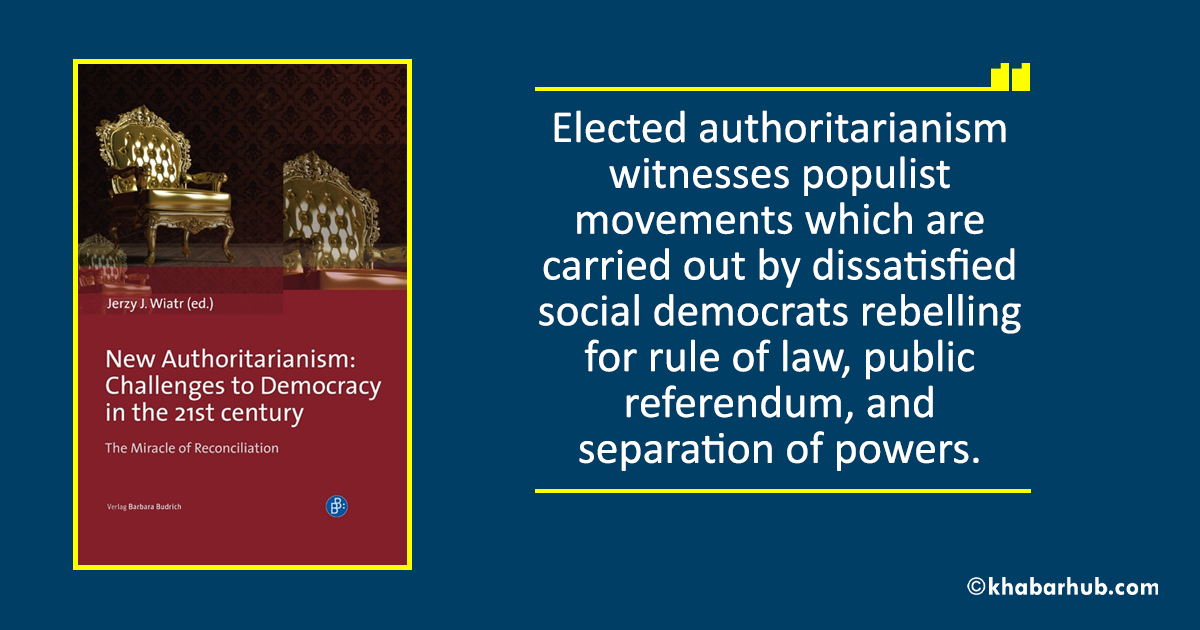Social scientists have long confronted a dilemma regarding the future of transitional democracies. Despite attempts at mirroring the West and absorbing liberal democratic values, what has come into existence is a hybrid regime that neither captures the essence of democracy nor refutes dictatorship.
To examine this regime in detail and scrutinize it from both theoretical and empirical perspectives, New Authoritarianism: Challenges to Democracy in the 21st Century raises serious questions about the efficacy of democracy and authoritarianism.
The book gathers an impressive collection of political analysts to outline the retreat of democratic traditions and the rise of authoritarianism in countries like Hungary, Kenya, Poland, Russia, and Turkey.
Well-researched and constructed, New Authoritarianism follows a logical structure in each of its chapters that reflects the expertise of the authors.
A leading theme throughout the book is the process through which political leaders’ transition from democracy to authoritarianism.
Each case-study provides systematic insights into countries that evolved from dictatorship to democracy, only to revert to a new form of authoritarianism (referred to in various places as controlled democracy, delegative democracy, electoral authoritarianism, and illiberal democracy).
New Authoritarianism was originally part of a special journal issue of Sociological-Political Studies. The editor of both the book and the journal’s special issue, Jerzy J. Wiatr, explains that neo-authoritarianism is not about “naked power,” but seeks public support and elected authoritarian leaders.
A leading theme throughout the book is the process through which political leaders’ transition from democracy to authoritarianism.
The analysis marshaled in this thin volume offers an impressive comparative assessment that explains the fragility of these new political systems and identifies the primary features of a new authoritarianism.
Through an intermingling of political theory and analytical case studies, the book investigates the conditions under which “illiberal democracy” rises and liberal democratic policies are discredited and discarded.
Author Hans-Georg Heinrich claims that new authoritarianism does not denounce democracy altogether but is a reaction to the liberal elites who either ignored the electorate or did not share their values.
Finally, excessive free services extended by the elected authoritarians were beginning to exhaust the finances which led the state towards inflation.
For new authoritarianism to gain legitimacy, a section in society was deemed necessary that shares the concerns of the elected authoritarian leader. Peter Anyang Nyongo offers the term “house of loyalists” and Ilter Turan calls it the class of “state elites”.
Turan argues that investing in the socio-economic modernization of Turkey was essential for preventing its demise.
And the top-down approach to expedient change necessitated the building of “men of the state” who would be trained cadres, diplomats, intellectual, officers, etc. equipped to handle the state services and the pattern in which the Turkish society needs to be transformed.
Secondly, elected authoritarianism witnesses populist movements which are carried out by dissatisfied social democrats rebelling for rule of law, public referendum, and separation of powers. Klaus von Beyme cites the examples of Hungary, Slovakia, Czech and Poland where xenophobic and semi-authoritarian national parties face populists who are defenders of their culture.
To control their agitations, the government begins to accommodate populist demands and appease them.
As a result, there is a gradual tolerance towards the policies of the elected authoritarianism. Janusz Reykowski who examined the 2015 parliamentary elections in Poland, argues that new authoritarianism was beginning to garner support from those who previously felt victimized by the system.
Likewise, Turan’s study of new authoritarianism in Turkey denotes that illiberal policies of the government were accepted due to mass clientelism.
Finally, excessive free services extended by the elected authoritarians were beginning to exhaust the finances which led the state towards inflation.
The deteriorating economy necessitated stringent controls and strategization, by the government. The structural changes as Reykowski enumerate controlled market forces, the domination of indigenous industries, and constitutional reforms. Nataliya Velikaya takes up the example of Russia and argues that there are limited opportunities for the development of a political party system under new authoritarianism.
Due to intra-party fragmentation, lack of ideological unity, institutional barriers and manipulation of votes, the opposition parties seldom pose as a viable alternative to the authoritarian government.
The new authoritarianism, while similarly centralizing state power, substitutes public education campaigns and minimizes the use of violence to gain public acceptance.
Similarly, Nyongo argues that while regular elections are conducted to maintain the façade of democracy, the focus on one-party by new authoritarians is regarded best for the political stability of the state.
New Authoritarianism is a good addition to the existing literature on hybrid regimes and their purpose.
The book’s contribution is the answer to an important question in comparative politics – the difference between democracy, authoritarianism, and the rise of new-authoritarianism.
The impression created by this book is that political leaders of an authoritarian regime traditionally proclaimed universal truths while fomenting revolution to overthrow preexisting governments.
The new authoritarianism, while similarly centralizing state power, substitutes public education campaigns and minimizes the use of violence to gain public acceptance.
The new authoritarianism accommodates popular demands and proceeds legally. However, there is worrisome hypocrisy about democracy when opposition movements are harassed, political decision-making monopolized, and control over media outlets and other communication channels are inaugurated.
What could have strengthened the analysis, even more, is a discussion on the longevity of such form of regimes, how the setup of democracy is going to last in the shadow of new authoritarianism and, whether the perception of new authoritarianism is going to capture the public imagination in the long run.
Nevertheless, New Authoritarianism is quite resourceful for advanced researchers who want to study the prevalence of authoritarianism in the 21st century, the reasons for partial acceptance of democracy, and the impact that illiberalism creates on the state.
(Dr. Aditi Paul is a Research Associate at NIICE)
(Nepal Institute for International Cooperation and Engagement (NIICE), Nepal’s independent think tank, and Khabarhub — Nepal’s popular news portal — have joined hands to disseminate NIICE research articles from Nepal)









Comment